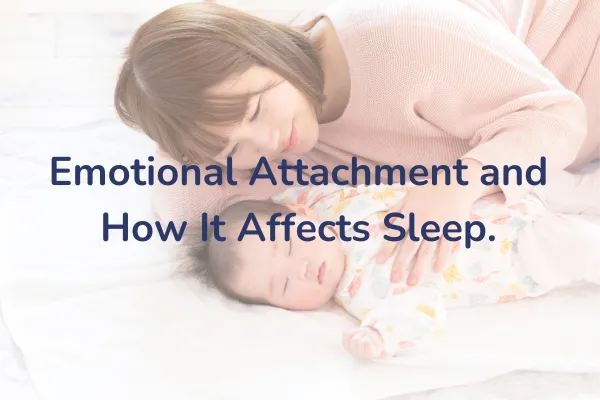
Emotional Attachment and How It Affects Sleep.
Emotional Attachment and How It Affects Sleep.
By Kath Garwood, Certified Sleep Nanny® Partner
Understanding Emotional Attachment
As parents, we all want our children to feel safe, secure, and deeply loved. The bond you create with your child—their emotional attachment to you—is the foundation for their confidence, resilience, and wellbeing. But for many families, sleep challenges can bring up big worries:
“Will sleep training damage my child’s trust in me?”
“If I encourage my child to sleep independently, will it affect our bond?”
“Is it possible to improve sleep without risking emotional harm?”
These are valid questions, especially for working mums who juggle busy schedules and want the very best for their little ones. The good news is, research shows that gentle, responsive sleep coaching not only supports healthy sleep but also protects—and can even strengthen—your child’s emotional attachment.
What Is Emotional Attachment?
Attachment is the deep, lasting bond that forms between a child and their caregiver. It’s built through consistent, loving responses to your child’s needs—feeding, comforting, playing, and, yes, helping them settle at bedtime. Decades of research (Ainsworth, Bowlby, et al.) show that secure attachment develops when children know their parents will respond with warmth and reliability, especially during times of stress or change.
The Sleep Training Myth: Will My Child Feel Abandoned?
One of the most common fears is that sleep training—especially any approach that encourages a child to fall asleep without a parent present—might harm attachment. But here’s what the science actually says:
Evidence From Recent Studies
A landmark 2012 study by Gradisar et al. (published in Pediatrics) followed families using gentle sleep training methods, such as “camping out” or “controlled comforting.” The researchers tracked children’s emotional attachment, stress levels, and parent-child bonds over one year.
Result?
There was no evidence of harm to emotional attachment or increased stress. In fact, children whose families used gentle sleep training were just as securely attached as those who didn’t—and often slept better, which improved family wellbeing overall. Win win!
Another review (Middlemiss et al., 2012, Early Human Development) found that when sleep training approaches are responsive and gentle—meaning parents check, comfort, and reassure their child as needed—attachment security is not compromised.
What About “Cry It Out”?
It’s important to note that most attachment concerns come from misunderstandings about “cry it out” methods. Here at the Sleep Nanny®, our approach is different:
No “cry it out”
No leaving a child alone to cry without support for prolonged periods
Always being responsive to your child’s needs
Gentle methods focus on giving children the skills to self-settle, while always providing reassurance and connection. This is key for both emotional security and healthy sleep habits.
How Emotional Bonds Support Sleep
A strong emotional bond actually makes sleep coaching easier. Children who feel secure are more likely to trust that you’re nearby, even when they can’t see you. Here’s how attachment and sleep work together:
Predictability: When bedtime routines are consistent, children know what to expect. This predictability lowers anxiety and builds trust.
Reassurance: Gentle sleep coaching allows you to offer comfort as your child learns new skills, reinforcing that you’re always there for them.
Confidence: As your child masters independent sleep, their confidence grows—not just at bedtime, but in all areas of life.
Real-Life Results: What Families Say
Many of the families I support share the same transformation:
Less bedtime stress
Happier, more rested children
Stronger parent-child connection
Here’s what one mum recently told me:
"I was so worried that sleep training would make my daughter feel abandoned. But with Kath’s gentle approach, I was able to stay close, offer cuddles, and see her learn to fall asleep on her own. Now we’re both sleeping better—and our bond is stronger than ever."
Practical Tips for Gentle, Attachment-Friendly Sleep Coaching
Stay Consistent: Keep bedtime routines predictable and loving.
Respond to Needs: Comfort your child when they’re upset—gentle sleep training never means ignoring distress.
Use Gradual Steps: Move at your child’s pace. Small changes add up to big results.
Communicate: Talk to your child about what’s happening, even if they’re very young. Your voice is reassuring.
Look After Yourself: Well-rested parents are more responsive and emotionally available.
The Takeaway
You don’t have to choose between healthy sleep and a secure emotional attachment. With gentle, evidence-based support, your child can learn to sleep independently while knowing you’re always there for them.
Sleep training, when done with love and responsiveness, is not only safe—it’s a gift to your whole family.
If you’re struggling with sleep, you’re not alone. I’m here to help with bespoke plans that honour your child’s needs and your family’s values.
References:
Gradisar, M., et al. (2012). Behavioral Interventions for Infant Sleep Problems: A Randomized Controlled Trial. Pediatrics, 129(4), e642-e651.
Middlemiss, W., et al. (2012). Responsive Parenting and Child Sleep: A Review. Early Human Development, 88(10), 761-767.
Ainsworth, M.D.S., & Bowlby, J. (1991). An Ethological Approach to Personality Development. American Psychologist, 46(4), 333-341.